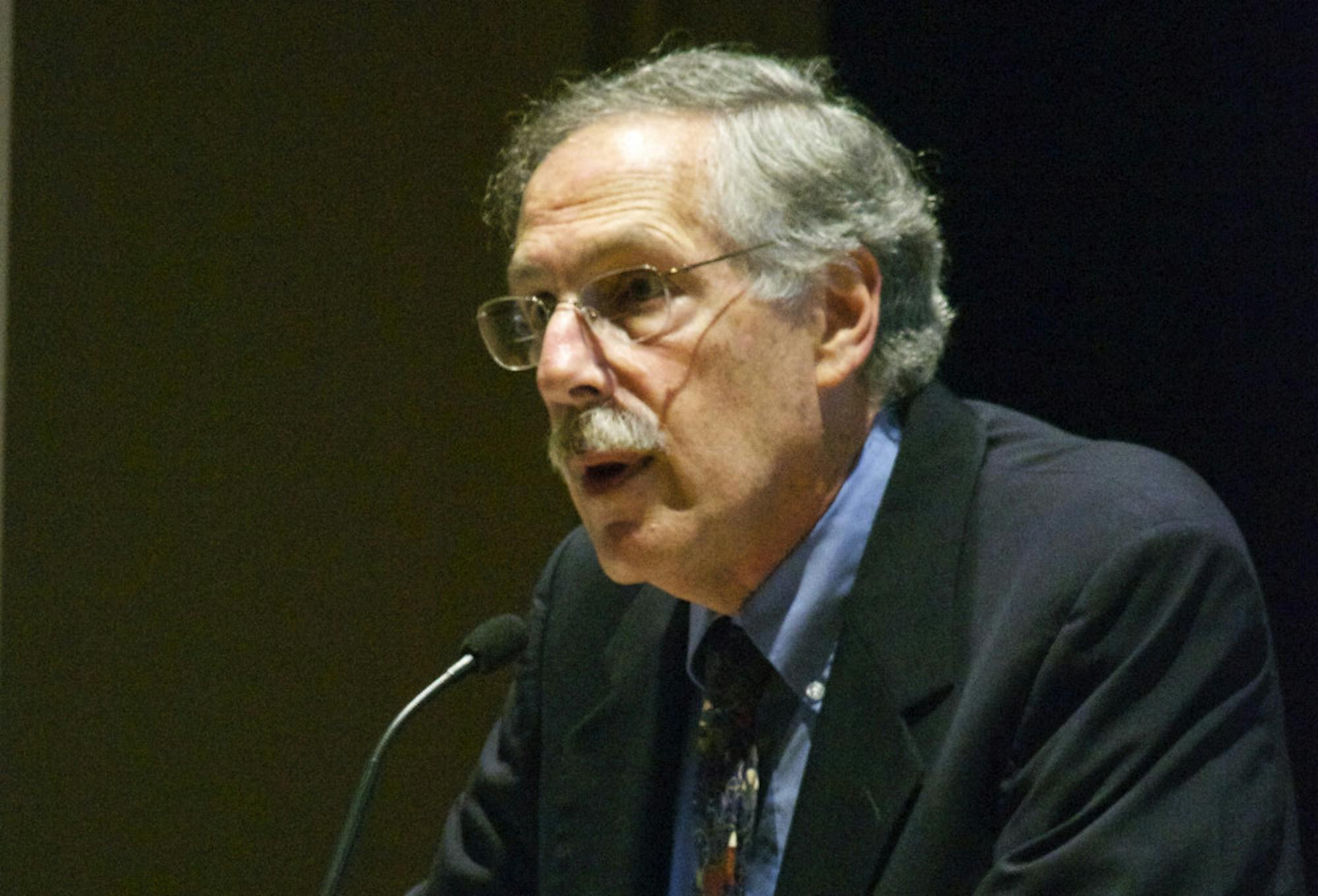The second annual "Free Thinkers" lecture series, presented by the Osher Lifelong Learning Institute, began Thursday with MIT Professor and Nobel Prize-winner Peter A. Diamond. His lecture, entitled “Unemployment and Debt,” focused on the unemployment rate and the amount of debt the United States has accumulated, and how the government can work to lower both of them.
According to Diamond's Nobel Prize-winning theory, the labor market does not follow a typical supply and demand cycle, in which mutual benefit quickly brings buyers and sellers together. In his lecture he explained that the labor market is more complicated -- there are discrepancies between the skills required for a job and the skills that potential employees may or may not possess.
To begin, Diamond compared the current unemployment rate to the unemployment rate before the 2008 recession. A person’s state of employment can be categorized in three ways: a person can be employed, unemployed and searching for a job or unemployed and not searching for a job -- also referred to as "out of the labor market," he said. Diamond then explained that the number of people who have been unemployed for less than six months is back to where it was before the recession, and that the number of people who are out of the labor force is steadily decreasing.
“In a typical month, more people were hired who were 'out of the labor [market]'”, Diamond said. "[This is a] shocking fact.”
According to Diamond, the United States' labor market and its nature of employment are very fluid. He explained that each month, approximately 4.5 million workers are hired; in the same month almost 4.3 million workers are fired or quit, resulting in a net gain of 200,000 new employees every month. While this may seem like a high number of new employees, however, Diamond noted that there were approximately 1 million more new workers per month before the recession.
Diamond also discussed the role of debt in the economy. After the recession, public debt shot up, he said. This increase of debt has the potential to cause a bond market crisis. If the public is worried about the government’s ability to pay its debt, then interest rates on bonds will increase. The result is an increased debt and a decreased ability to pay it, which can have very dangerous effects on the economy.
In order to think about repairing the economy, Diamond's main question is how to develop legislation today that has the potential to help in the future.
"[There are] policy issues we really need to jump on,” he said regarding long-term benefits.
The two issues he sees as most important are infrastructure and education.
In discussing infrastructure, Diamond quoted Secretary of the Treasury Jacob J. Lew, from the Infrastructure Investment Summit this September.
“Our infrastructure deficiencies hinder economic growth, undermine business productivity and hurt family budgets," he said. "Inadequate infrastructure costs Americans as much as $120 billion a year in extra fuel and lost time."
According to Diamond, this problem has been growing since 1980, and continuing to ignore it may lead to more debt from constant repairs, as well as leaving resources idle. Furthermore, he explained, fixing infrastructure now would be convenient, as it would stimulate the job market and the economy.
"[This would] create further jobs... and additional tax revenue," he said.
The other major policy issue that Diamond believes should be addressed is education.
“Hundreds of thousands of teachers [were laid off] during the recession,” Diamond said.
Firing teachers and cutting funding for research was, therefore, “moving in the wrong direction."
Diamond believes research and education lead to technological improvements and therefore economic growth.
“Cutting investments is no way to think you’re being economical,” Diamond said.
He also discussed a number of alternative methods for improving the economy. He frequently emphasized the need for increased tax revenue, and mentioned that additional tax revenue from the "top ten percent of income distribution” could make a huge difference.
Diamond also weighed in on the current minimum wage debate, saying he was in favor of increasing the minimum wage. After of years of research, Diamond concluded that modest increases in wages do not have a significantly adverse effect on the job market. While he admitted that some firms might cut back on employment, he determined that raising the minimum wage would ultimately be a good economic decision.
He emphasized the positive influence this wage increase would have on the economy.
“'[There would be] additional benefit from more spending [and] more earning,” he said.
To conclude his lecture, Diamond advised a redistribution of government spending.
“There are programs that should be cut and programs we should expand,” Diamond said.
Diamond believes that transferring money from programs that are superfluous to those that need more spending will help to readjust the economy.
Diamond ended his presentation by comparing today’s attitude toward taxes with that of the 18th century and quoting James Madison.
“We [the American colonists fighting in the War of Independence] have shed our blood," he quoted Madison as saying. "We are ready to shed the last drop in its defense. Nothing is above our courage, except only the courage to tax ourselves."
Director of the Osher Lifelong Learning Institute David Fechtor expressed excitement about Diamond’s lecture and the popularity of the "Free Thinkers" series last year, which included lectures by biologist Edward O. Wilson and New York Times Executive Editor Jill Abramson.
"The first 'Free Thinkers' series was so successful," Fechtor said. "I have the best job in the world.”
'Free Thinkers' lecture series starts with Nobel Prize-winning economist

The Osher Lifelong Learning Institute hosted the first of a series of free lectures with Professor Emeritus of MIT, Peter Diamond speaking about economic challenges facing the country.





